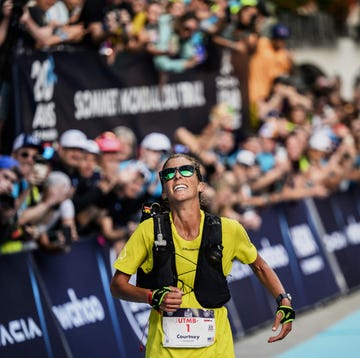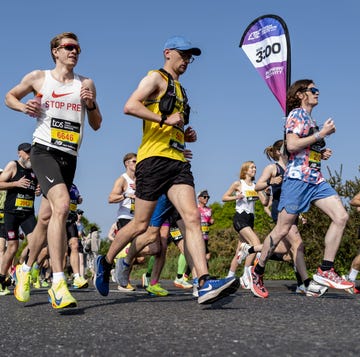Heatwaves aren’t for everyone – especially if you’re a runner who is training for or taking on a race. Running in hot weather puts additional stress on the body and can lead to overheating and dehydration if left unmanaged. Plus, as anyone who ran this year’s too-warm London Marathon will testify, the heat can play havoc with your time goals.
While most of us assume – correctly – that the heat will slow us down, not many of us know the extent to which we need to adjust our pace in hot conditions. So, how much slower does the heat make you on race day?
Running journalist and creator of the Running Writings website John Davis has the answers. Using the 2022 Mantzios et al study as the data source, Davis investigated marathon performances across a range temperatures and humidity levels, covering some 754 races.
What everyone's reading
What’s the optimal temperature for marathon performance?
From the data, Davis proposes that the optimal temperature for marathoning is a rather nippy 2-13°C. While 9°C is probably the absolute ideal, anywhere within the 2-13°C range is almost as good. While humidity levels play a part too (more on this below), the effects don’t kick in properly until temperatures reach around 18°C.
When does the heat start to slow you down?
Once temperatures get to 18°C or higher, performance drops off fairly rapidly. That’s partly because humidity is likely to be higher in those temperatures, slowing you down further. For reference, one seriously hot day with 75% humidity can slow your pace by 6%. For a would-be four-hour marathoner, that increases your time by about 14 minutes.
What is the heat index?
To help illustrate the data, Davis created the heat index. It combines air temperature and humidity to help you make accurate adjustments to your goal pace. The figures represent your percentage slow down in the corresponding temperature. For example, in approximately 20°C and 65% humidity, expect your marathon time to slow by about 3%. For a 3:30 marathoner, that would mean around 6 minutes and 20 seconds added to your finish time. (Note: degrees celsius is shown across the top of the table.)
Top tips for running in the heat
As well as making some sensible pace adjustments, there are various other things that you can do to mitigate the impact of running in the heat. Here, Heather Black, a personal trainer at Welltech, weighs in on what you should (and shouldn’t) do to run safely during a heatwave.
Drink to thirst
As a ballpark, we should aim to consume between 300ml and 800ml of water per hour while running, as well as 530ml of water before and after a workout. This is particularly important when running in hot and humid conditions, as your body needs even more water to function safely.
‘When you work out in the heat, your body taps into more of its water supply to keep you cool and regulate your temperature,’ says Black. ‘That’s why it’s crucial to start your workout with adequate hydration. This doesn’t mean waiting until you’re parched or only sipping on water after a run. It means drinking a glass or two of water before you begin and continuing to take regular sips throughout your session. Without this, your risk of dehydration rises – and that doesn’t just affect performance. It can lead to serious health issues.’
Douse yourself
Dousing yourself in water, as runners often do at water stations during a race, can help you to finish faster – and a recent study proves it. The study in question looked at 13 runners who completed a hot, humid 10K with ‘dousing’ and an identical one without. The result? The runners finished 27 seconds faster in the dousing condition. So, if you’re training rather than racing, consider dousing yourself with water before you leave the house.
Add salt to the mix
Running on a hot day means more sweating – and this sodium needs to be replaced. Nutritionist Renee McGregor estimates that at a temperature of 20°C, the average runner loses about 1,230mg of sodium per hour, which can lead to gastrointestinal distress, dizziness and heat stress. Top up your sodium stores with salt tabs, sports drinks and real food.
Avoid protein shakes and energy drinks
Although protein shakes and energy drinks are a go-to for many exercise enthusiasts, Black says that they don’t offer the hydration that your body needs during a run or workout in hot weather.
‘Research shows that increased protein intake requires more water, so swapping your water bottle for a protein shake mid-workout can actually leave you less hydrated,’ says Black. ‘These shakes are best reserved for post-workout recovery, not as a replacement for hydration during exercise. The same goes for energy drinks. Their high-caffeine content can have a diuretic effect, which means that they may actually contribute to dehydration rather than help to prevent it.’
Dress for the heat
Wear loose, breathable clothing and a cap to protect you from the sun or sweat bands to stop the sweat from dripping in your eyes. Opt for a lightweight vest to keep you cool, as well as a pair of sunglasses to keep the glaring sun out of your eyes.
Remember to warm up
As counterintuitive as it may sound, you still need to warm up properly before going out for a run in hot weather. If you skip your warm weather warm-up, says Black, you could experience soreness or even injury later on.
‘Warm-ups shouldn’t be skipped just because it’s hot outside,’ she adds. ‘They’re essential for widening your blood vessels and delivering oxygen to your muscles. This process prepares your body for exercise and helps to reduce the strain on the heart. It’s not about the temperature outside – it’s about getting your body ready to perform safely.’














